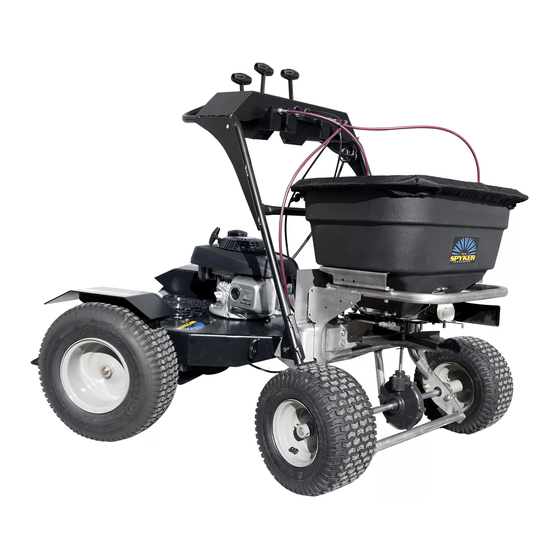Table of Contents
Advertisement
Quick Links
Advertisement
Table of Contents

Summary of Contents for SPYKER S100-12010
- Page 1 Operator's Manual Model S100-12010 Ride-on Spreader This manual contains information for the safety IMPORTANT of persons and property. Read it carefully before assembly and operation of the equipment! Spyker Spreaders Contact Us at 800.972.6130 ©2012 Brinly-Hardy Co. 1009104 Rev. A...
- Page 2 PRACTICE MANEUVERING, (FORWARD, REVERSE, LEFT, RIGHT). WARNING DO NOT STEP, STAND, OR SIT. Safety Alert Symbol CAUTION: THE Spyker S100- 1008867 (Not to Scale) 12010 Ride-on Spreader should WARNING only be operated and maintained by thoroughly trained individuals. The DO NOT STEP , STAND, OR SIT.
-
Page 3: Safety Precautions
5. Never let children or untrained people operate or service the equipment. Local regulations may restrict the age of ATENCIÓN the operator. 6. The owner/user can prevent and is responsible for accidents or injuries occurring to themselves, other people Para evitar sufrir lesiones, respete or property. -
Page 4: Specifications
23. Do not exceed hopper capacity listed in Specifi cations Section. 24. To prevent injury from hand, never place hands into hopper while fan is spinning. SPECIFICATIONS Model: S100-12010 Engine Mfg. Subaru 5.5 @ 3600 RPM Type 4 Cycle Single Cylinder... - Page 5 7. Check the engine oil level and the function of all controls per instructions in OPERATING INSTRUCTIONS Section and MAINTENANCE Section. 8. Calibrate spreader according to instructions in SPREADER OPERATION Section. OPERATING INSTRUCTIONS Remove Engine ON/OFF Hopper Side Accuway Spread Switch Shut-Off Defl...
- Page 6 5. Hopper Shut-Off Lever: Rearward Control Speed Cable Forward Control Speed Cable Open and close the hopper gate by pushing the lever forward to open the gate, and pulling the lever rearward to close the gate. 6. Accuway Spread Calibration Lever: To adjust spread pattern for uniform distribution, adjust the Rearward Control Forward Control...
-
Page 7: Maintenance
B. Daily Maintenance and Storage After Spreading CAUTION: Machine may coast when coming to stop. Always ensure there is 1. Park the machine on level ground outside the storage enough clear space around machine to facility with the engine shut off. allow machine to come to a complete stop 2. -
Page 8: Spreader Operation
(see Specifi cation Section). trans-axle is not owner repairable. If you have a problem with a 5. Set dial to correct position. If a Spyker dial setting is not trans-axle, call the Spyker Service Hot line. Do not disassemble found with broadcast material information, use the size the trans-axle. - Page 9 6. Travel to spreading location. (damp or dry or over-pulverized) and weather conditions, are 7. Ensure area surrounding spreader is clear of bystanders. all contributing factors. For these reasons, it’s often a good 8. Engage Speed Control Lever to ensure speed is 3mph. idea to spread the area 2 times - at one-half rate - in cross 9.
- Page 10 NOTE: Dial Settings Are Approximate Only ! Dial Settings Dial Settings Full Rate Half Rate Lbs. per Once Over Twice Over Product Particle Size 1000 sq. ft. Fine Pellets Mixed Fine Pellets Small Pellets Nitrogen Pellets Medium Size Medium Pellets And Granuals Large Heavy Pellets...
- Page 11 This Page Intentionally Left Blank ©2012 Brinly-Hardy Co. 1009104 Rev. A...
-
Page 12: Year Limited Warranty
Spyker Spreaders will not be liable for any loss, damage or expense including, but not limited to, consequential or incidental damages, arising from the operation, condition or use of the item.







Need help?
Do you have a question about the S100-12010 and is the answer not in the manual?
Questions and answers